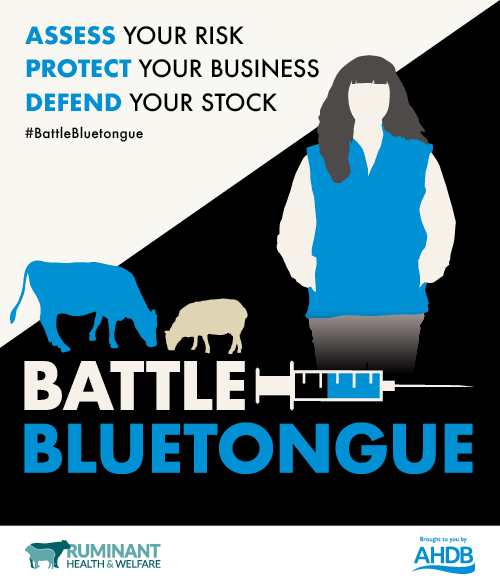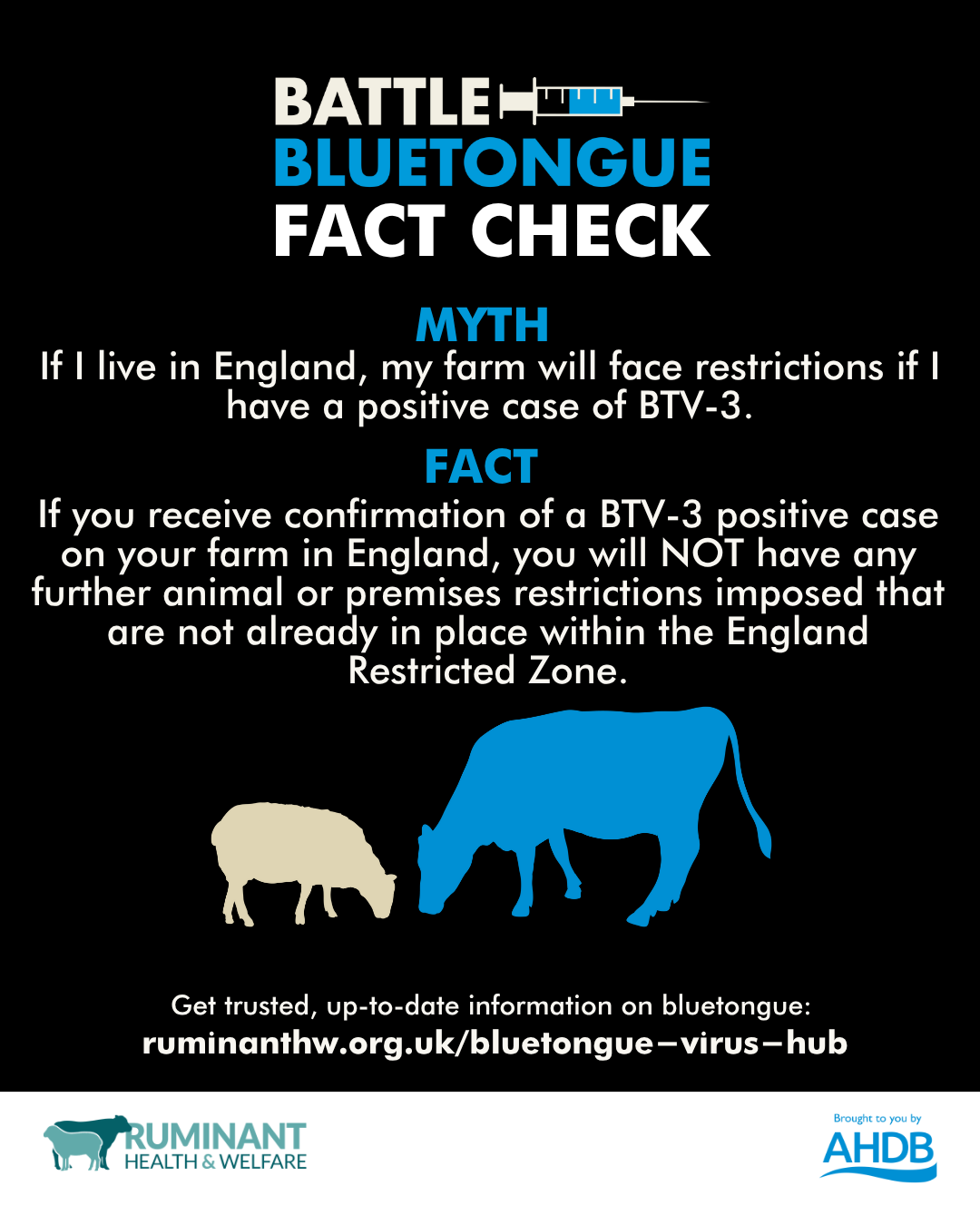- Home
- Bluetongue virus latest news
Bluetongue virus latest news
16 February 2026
The latest updates, news and advice about the current bluetongue virus serotype 3 (BTV-3) situation in the UK.
Latest situation
There have been 290 cases of bluetongue in Great Britain in the 2025 bluetongue season (since July 2025).
- In England, there have been 269 cases of bluetongue – including 261 cases of only BTV-3, 1 case of only BTV-8 and 7 cases with both BTV-3 and BTV-8
- In Wales, there have been 21 cases of BTV-3
- There have been no cases in Scotland
- In Northern Ireland, there have been 5 confirmed case of BTV-3
The location of all premises in Great Britain where one or more animals have tested positive by PCR to bluetongue serotype 3, serotype 8 or serotype 12 is available on the bluetongue case map.
View the latest situation from Defra
What to do if you suspect an animal has bluetongue
Bluetongue is a notifiable animal disease. If you suspect it you must report it immediately by calling the Defra Rural Services Helpline on 03000 200 301. In Wales, contact 0300 303 8268. In Scotland, contact your local Field Services Office. Failure to do so is an offence.
If you have further questions or if you would like to speak to someone, call the AHDB bluetongue hotline on 024 7771 0386.
Vaccination
Defra’s Secretary of State has permitted the use of three bluetongue serotype 3 (BTV-3) vaccines within the UK, subject to a valid licence or declaration.
For more information about the vaccines, see our vaccine comparison tables.
Vaccination cost calculator
Calculate how much it will cost to vaccinate your livestock against bluetongue virus and how much it could save you using our interactive calculators.
Fertility and scanning rates
As lambing season approaches, we’re asking sheep scanners to share practical guidance on fertility issues and encourage farmers to consult their vet if scanning results are lower than expected.
To help you understand the issues, we'll be sharing resources specifically for scanners on the Ruminant Health & Welfare website.
If you're a sheep scanner and would like to be kept up to date with the latest information and resources, complete our short form to be added to our directory.
Sign up to receive information on BTV
Explore our resources for scanners
Moving animals and pre-movement testing
Bluetongue movements checker tool
Use this interactive tool to find the correct advice and licensing requirements for moving animals within or across a border within Great Britain.
It will help you find what movement licences are needed, as well as highlighting when pre-movement testing and or vaccination is required as a legal stipulation of a movement.
There are specific answers for moves to other farm premises, shows, markets or abattoirs, taking into account the devolved Government policies on BTV-3 across England, Wales and Scotland.
Check the latest movement licences and designated slaughterhouses (GOV.UK)
Regional requirements
Pre-movement testing requirements vary by region – check the latest situation in your area using the links below.
View the latest situation in England
View the latest situation in Scotland
The Welsh Government announced an all-Wales BTV-3 Restricted Zone as of 10 November 2025. This allows free movement of livestock between England and Wales.
View the latest situation in Wales
Collecting samples
You must commission your own private veterinary surgeon to collect samples at your cost.
Guidance on collecting and sending samples can be found on the Improve International and Pirbright Institute websites; this guidance must be followed if using a private veterinary surgeon.
Samples must be submitted directly to the Pirbright Institute.
Apply to move animals out of bluetongue zones
Battle Bluetongue campaign

Vets and stakeholders across the ruminant sector are being urged to support a new industry campaign – Battle Bluetongue – which encourages farmers in England to consult their vet about vaccinating their herd or flock against bluetongue virus serotype 3 (BTV-3).
The three key messages are:
- Assess your risk: vets and farmers working together to evaluate the risk to BTV-3 on farms by using our vaccination calculators and decision-making tool.
- Protect your business: safeguard businesses from restrictions by managing all identified risks that can be controlled on livestock holdings.
- Defend your stock: vaccinate the right animals for BTV-3 to reduce transmission and stop the spread.

Decision-making tool
Understand your risk factors and develop a farm-specific plan with your vet using our decision-making tool.
BTV-3 vaccine decision-making tool
Email ruminantHW@ahdb.org.uk for more information and to request a Battle Bluetongue campaign pack or visit the Ruminant Health and Welfare website.
Bluetongue virus webinars
Our webinars provide the latest updates and presentations from industry experts on bluetongue.
The webinars offer vet practitioners and other stakeholders valuable technical information about BTV-3 that will help answer farmers' questions.
You can also submit questions ahead of the webinars.
If you miss any of the events, you can catch up with the recordings on YouTube.
Where is bluetongue?
Frequently asked questions
A series of frequently asked questions (FAQs) have been developed with Defra and the wider industry to ensure you have factual, up-to-date information on bluetongue (BTV) during vector high-risk periods.
Farmers and the industry are reminded they must remain Aware, apply Caution and use evidence-based Tactics (ACT) to mitigate against the virus.
- Awareness of how BTV-3 is transmitted as a vector-borne disease
- Caution against any misinformation, but instead view the latest facts
- Tactics on farm to help with midge control must be evidence-based
What is bluetongue?
Bluetongue is a non-contagious, viral disease affecting domestic and wild ruminants and camelids, which is transmitted by biting midges. It does not affect people or food safety, but outbreaks can result in prolonged animal movement and trade restrictions.
Clinical signs include:
- Lameness
- Lethargy
- Ulcers/sores around nose and mouth
- Fever
- Not eating
- Milk drop
View photos of the clinical signs of bluetongue
Find out more about BTV, including how to spot, prevent and control it

